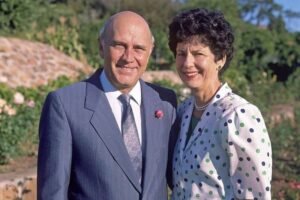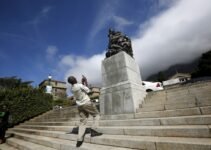As the sun paints the South African sky on April 11, the whispers of the past echo in the air. Like many threads woven into the nation’s vibrant tapestry, this date holds stories waiting to be unearthed. We embark on a journey of exploration, delving into the triumphs, tragedies, and turning points that mark April 11 in South Africa’s history.

2007: Bushman artist Vetkat Regopstaan Kruiper, 38, dies suddenly from natural causes
Regopstaan Kruiper, also known as Vetkat, was a talented artist from the #Khomani Bushmen. Despite having no formal training, Vetkat became famous for his art inspired by his cultural heritage and the desert.
2002: Dr Wouter Basson is acquitted
Dr Wouter Basson, a South African biological warfare expert, was acquitted of forty-six charges including murder, conspiracy, drug possession, and fraud. He was involved in South Africa’s covert chemical and germ warfare operations against anti-apartheid activists during the apartheid era.
2001: Ellis Park soccer stampede kills 43
43 people were killed and 250 injured in a stampede at Ellis Park stadium, Johannesburg during a football match between South Africa’s two biggest teams, Kaizer Chiefs and Orlando Pirates. The stadium was already full to over capacity when people poured in. Most of the deaths occurred when the waiting crowd rushed the gate. Fans criticized the clubs’ attitude to safety and the police for not keeping order outside the stadium.
1996: Widespread violence and intimidation in 1996 Kwazulu-Natal
The violence in kwaZulu-Natal began with interference during the voter registration process before the local government elections in 1996. Elections were postponed due to clashes between the Inkatha Freedom Party and African National Congress members. The delay caused more violence and 1500 people were killed in the province since 1994.
1986: Peter Nchabeleng President of Northern Transvaal UDF dies
Peter Nchabeleng, former president of United Democratic Front in Northern Transvaal, dies in police cells in Schoonoord, Lebowa. It is alleged that he was tortured while he was in custody. Before his arrest, Nchabeleng received a letter bomb containing his son’s school results. He refused to open the letter and directed his son Maurice to return it to the principal. According to Maurice, the principal was aware that the envelope had contained a letter bomb. After he escaped this bomb trap he was arrested by police at his home in the presence of his wife Gertrude. Two days after he was arrested his wife received the devastating and shocking news that her husband has died in hospital. The cause of his death was undisclosed. However, his son who testified before the TRC’s human rights violations committee in Pietersburg, gave a different version from the one given by the police. Maurice testified “he was told by a security branch policeman that his father had been killed in the room and was ordered to wash his hands in his father’s blood before he ate”.
1979: Idi Amin is deposed as the President of Uganda
Idi Amin ruled Uganda from 1971 to 1979 after seizing power from President Obote Milton. In 1979, he was overthrown by a military coup led by rebels and exiles backed by Tanzanian forces. Amin launched an attack on western Tanzania in October 1978, which resulted in a counter-attack by the Tanzanian army. They reached the Ugandan capital of Kampala in early 1979, which forced Amin to flee to Libya and leave Tanzania in charge of the country.
1969: F.W. de Klerk marries Marike Willemse
F.W. de Klerk married Marike Willemse, a fellow student at the University of Potchefstroom, in 1958. They had three children, but divorced in 1998.
1961: Nigeria imposes sanctions on South Africa, and implements a total trade boycott
In 1961, Nigeria initiated a trade boycott against South Africa due to its apartheid policy. The boycott aimed to pressure the government to abandon its discriminatory policies.
1948: Manilal Gandhi leads a resistance group across the Natal
Certificate given to active supporters of the Passive Resistance Campaign During the Defiance Campaign, Manilal Gandhi leads a batch of Passive Resistors across the Natal-Transvaal border. He is not arrested, but members of his group are arrested and sentenced to three months hard labour.


